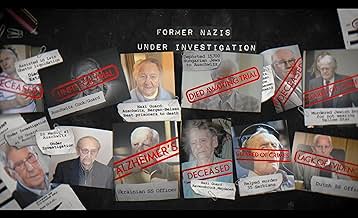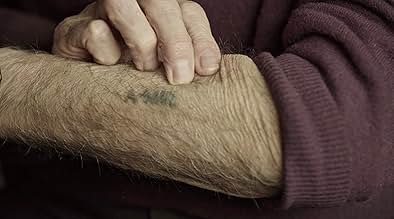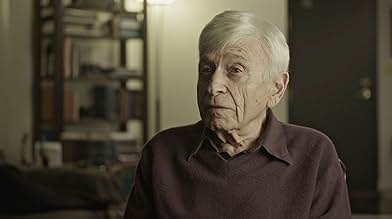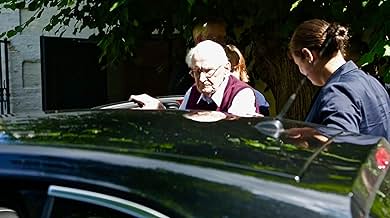The Accountant of Auschwitz
- 2018
- 1h 20m
IMDb RATING
7.3/10
3.2K
YOUR RATING
Seventy years after WWII, Oskar Gröning, one of the last surviving members of the SS, goes on trial as an accessory to the murder of 300,000 people at the Auschwitz concentration camp.Seventy years after WWII, Oskar Gröning, one of the last surviving members of the SS, goes on trial as an accessory to the murder of 300,000 people at the Auschwitz concentration camp.Seventy years after WWII, Oskar Gröning, one of the last surviving members of the SS, goes on trial as an accessory to the murder of 300,000 people at the Auschwitz concentration camp.
- Awards
- 7 wins & 5 nominations total
Alan Dershowitz
- Self
- (as Alan M. Dershowitz)
- Director
- Writer
- All cast & crew
- Production, box office & more at IMDbPro
7.33.1K
1
2
3
4
5
6
7
8
9
10
Featured reviews
Good documentary but needs more fact checking.
That accountant was guilty, justice is blind. Age is no excuse for crimes. The only question is how do you punish them in a fair way. But I stand firmly on the side of those that seek justice. There are a lot of complexities in bringing a trial about. But at the end of the day you need to punish the guilty, no matter how long it takes. Its the morally right thing to do. I don't want to sound draconian but if you are guilty of crimes against humanity then you are guilty.
This is not justice
In not to repeat the mistakes of history, we should learn about them. Oskar Groning was told in the 60s he would not be prosecuted. He openly and frankly discussed what happened at Auschwitz. He should not be prosecuted because he is doing more to prevent the repetition of history than his trial and conviction would ever achieve. Until he spoke, the world had only heard the story of the camp from one side. Thanks to Oskar, the history has been told.
If Oskar is to be prosecuted, then the member of the zondercommando, if alive, who admitted to killing a fellow prisoner who was German should be tried for murder.
If Oskar is to be prosecuted, then the member of the zondercommando, if alive, who admitted to killing a fellow prisoner who was German should be tried for murder.
Prosecuting History
This is a worthwhile addition to the genre of Holocaust documentary. It deals not only with activities of Gronig (the epynomous 'Accountant') but also the difficulties of prosecuting war criminals in their 90s. The movie also discusses the changed legal basis for recent prosecutions in the post-Demjanjuk years.
Courageous survivors seeking justice
RIP Eva Kor, who passed away this month, age 85. This was a fairly pedestrian documentary until Eva made an appearance and seemingly turned it on its head with her act of forgiveness.
The Accountant of Auschwitz is a lot more than just about Oscar Groning, the title subject. It focuses on the prosecution of war criminals in general, touching on some past cases and the lack of justice for survivors. The complexities of bringing former Nazis to justice is explored in depth.
The real emotional punches come from the interviews with survivors. They are remarkable people and represent the countless Holocaust victims with dignity, respect and courage.
I remembered seeing Oscar Groning in the 2005 BBC documentary - and immediately wishing that the smug man would somehow be brought to justice.
Even if you have seen Holocaust documentaries and films in the past - this will still hold your attention. It left me wanting to hug the nearest person and spread a little kindness in the world.
The Accountant of Auschwitz is a lot more than just about Oscar Groning, the title subject. It focuses on the prosecution of war criminals in general, touching on some past cases and the lack of justice for survivors. The complexities of bringing former Nazis to justice is explored in depth.
The real emotional punches come from the interviews with survivors. They are remarkable people and represent the countless Holocaust victims with dignity, respect and courage.
I remembered seeing Oscar Groning in the 2005 BBC documentary - and immediately wishing that the smug man would somehow be brought to justice.
Even if you have seen Holocaust documentaries and films in the past - this will still hold your attention. It left me wanting to hug the nearest person and spread a little kindness in the world.
Fascinating Psychology
A really fascinating look at how a criminal can truly make themselves believe that they are innocent. Wonderful documentary. A must watch.
- How long is The Accountant of Auschwitz?Powered by Alexa
Details
- Release date
- Country of origin
- Official site
- Languages
- Also known as
- Kassören i Auschwitz
- Filming locations
- Israel(location)
- Production companies
- See more company credits at IMDbPro
Box office
- Budget
- CA$600,000 (estimated)
- Runtime
- 1h 20m(80 min)
- Color
- Aspect ratio
- 16 : 9
Contribute to this page
Suggest an edit or add missing content









































